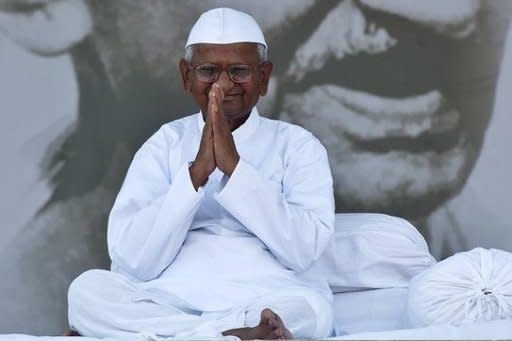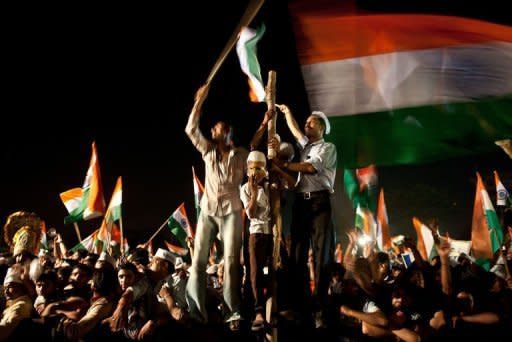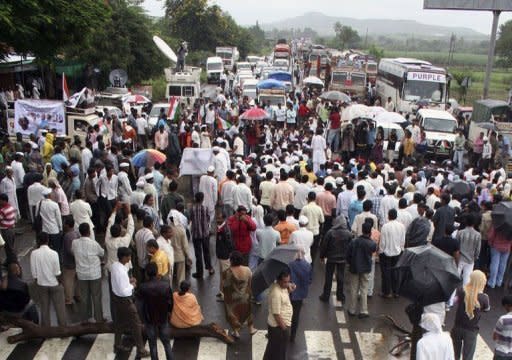Indian anti-graft activist ends 13-day fast
Indian anti-corruption activist Anna Hazare ended his 13-day hunger strike on Sunday triggering wild celebrations among supporters after parliament agreed to consider his demands. Hazare's fast at an open-air venue in New Delhi attracted tens of thousands of people every day as a nationwide protest movement emerged to back his cause, leaving the government appearing badly out of touch with public opinion. Hazare, who looked energetic and alert, took sips of coconut water mixed with honey handed to him by two young girls before delivering a speech broadcast live on national television. "The parliament in Delhi had to bow down to people power, but our fight does not end here," he said to huge applause. "We want to bring about a change in the country but within the framework of the constitution. "It is a matter of pride that such a big people's movement happened without resorting to any sort of violence," he added. "We have taught the world how to conduct a peaceful agitation." On Saturday, parliament agreed in principle that all state and central government officials would come under proposed anti-graft legislation being drafted by lawmakers and to a new citizens' charter promoting transparency. Prime Minister Manmohan Singh had struggled to respond to Hazare's protest, which tapped into a feeling of deep resentment among many Indians who must often pay bribes for everything from marriage certificates to hospital care. The site of the fast, the Ramlila grounds in central New Delhi, became a gathering point for company professionals, rural labourers and students keen to cheer on Hazare, who lay on a raised stage giving regular rousing speeches. The 74-year-old activist appeared to be in good health despite losing 7.5 kilogrammes (16.5 pounds) in muggy monsoon conditions. He drank water during his fast and left the stage each day between the evening and mid-morning. After his speech, he was taken to hospital to recover and undergo a full health check. Saturday's day-long debate in parliament on the stand-off between the government and Hazare ended with Finance Minister Pranab Mukherjee declaring lawmakers had agreed to many of the campaign's conditions in principle. Hazare, who modelled his image and tactics on independence leader Mahatma Gandhi, had captivated the country but polarised opinion. Many see him as a moral leader who exposed the culture of corruption and forced lawmakers to commit to passing tough new legislation that has been more than 40 years in the making. But critics see him as an autocrat who used sensationalist methods to impose his views on parliament and gave false hope that a law can eliminate endemic graft in Asia's third-largest economy. "The man who has become the hero of urban, middle-class Indians is ideologically almost Marxist in his hatred of the rich and almost anarchist in his contempt for democracy," columnist Tavleen Singh wrote in the Sunday Express. After initially attacking Hazare, the government accepted that his campaign reflected growing anger over corruption that pervades all levels of Indian life. Law Minister Salman Khurshid on Sunday congratulated Hazare on "a successful and peaceful" protest adding that "civil society should play an important role in the country's political system. This movement was an example." The fast's popularity was seen as a bruising defeat for softly-spoken Premier Singh, who appeared unable to engage with the nationwide debate on corruption. "He needs determination and willpower to push through reform, and he just doesn't have it. India is disappointed in him," Gurcharan Das, a bestselling author on contemporary India, told AFP. "Hazare has won in terms of his success in agitating people to find a voice," Das said. "In future people will be more assertive and confident in standing up to official misbehaviour. That is more important that any legislation issue at this moment." Singh's government has a poor reputation on high-level graft after scandals involving the over-budget Commonwealth Games last year and the flawed sale of telecom licences that cost the treasury up to $39 billion.




